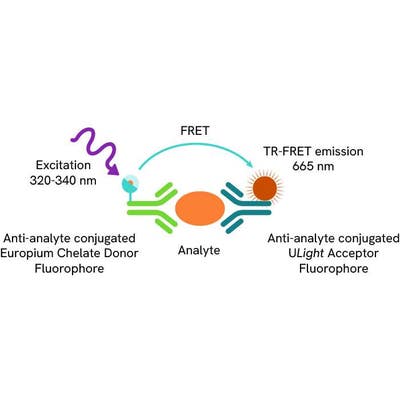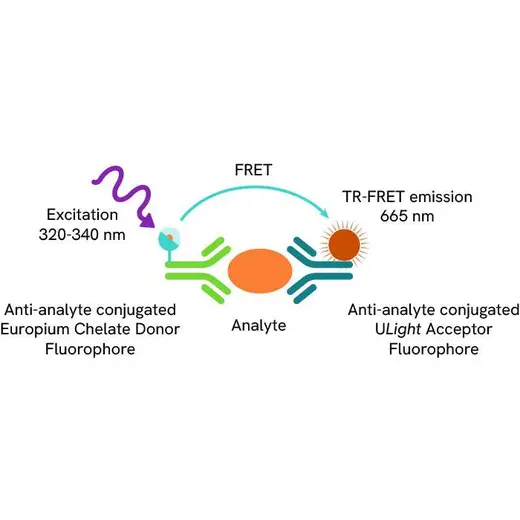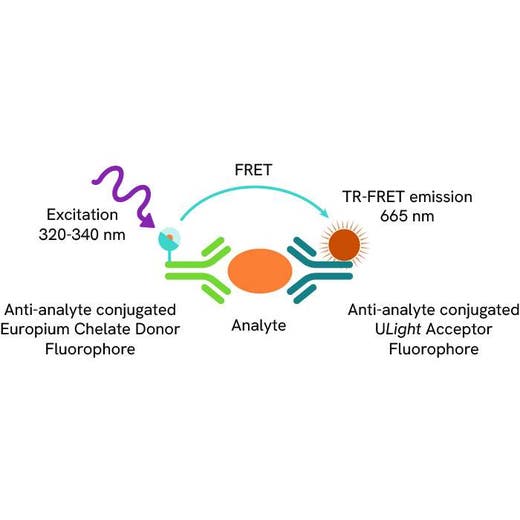
LANCE Ultra Total STAT3 Detection Kit, 10,000 Assay Points

LANCE Ultra Total STAT3 Detection Kit, 10,000 Assay Points




LANCE Ultra total STAT3 kits are designed for the detection of total STAT3 (phosphorylated and unphosphorylated) in cell lysates using a simple, homogeneous LANCE Ultra assay (no wash steps). This assay can be used as a normalization assay for phospho-STAT3, and is compatible with both adherent and suspension cells.
For research use only. Not for use in diagnostic procedures. All products to be used in accordance with applicable laws and regulations including without limitation, consumption and disposal requirements under European REACH regulations (EC 1907/2006).
| Feature | Specification |
|---|---|
| Application | Cell Signaling |
| Sample Volume | 15 µL |
LANCE Ultra total STAT3 kits are designed for the detection of total STAT3 (phosphorylated and unphosphorylated) in cell lysates using a simple, homogeneous LANCE Ultra assay (no wash steps). This assay can be used as a normalization assay for phospho-STAT3, and is compatible with both adherent and suspension cells.
For research use only. Not for use in diagnostic procedures. All products to be used in accordance with applicable laws and regulations including without limitation, consumption and disposal requirements under European REACH regulations (EC 1907/2006).


LANCE Ultra Total STAT3 Detection Kit, 10,000 Assay Points


LANCE Ultra Total STAT3 Detection Kit, 10,000 Assay Points


Product information
Overview
Please note control lysates are NOT included in kits. Control lysates are sold separately, catalog number TRF4004S.
Formats:
- Our 500 assay point kit allows you to run 500 wells in 384-well format, using a 20 µL reaction volume.
- Our 10,000 assay point kit allows you to run 10,000 wells in 384-well format, using a 20 µL reaction volume.
LANCE® and LANCE® (Lanthanide chelate excite) Ultra are homogeneous (no wash) TR-FRET (time-resolved fluorescence resonance energy transfer) technologies. One antibody of interest is labeled with a donor fluorophore (a LANCE Europium chelate) and the second antibody is labeled with an acceptor fluorophore [ULight™ dye]. Upon excitation at 320 or 340 nm, energy can be transferred from the donor Europium chelate to the acceptor fluorophore if sufficiently close for FRET (~10 nm). This results in the emission of light at 665 nm. Data are represented as ratiometric (665/615 nm X 10,000).
STAT3 is an important transcriptional activator, and is involved in regulating cytokines and growth factor receptors. STAT3 is phosphorylated at Tyr-705 by the JAK pathway, upon which STAT3 will dimerize, translocate to the nucleus, and bind DNA. In some cancers STAT3 is shown to be constitutively activated. It has been implicated in both anti-apoptotic and oncogenic pathways.
Specifications
| Application |
Cell Signaling
|
|---|---|
| Automation Compatible |
Yes
|
| Brand |
LANCE Ultra
|
| Cellular or Signaling Pathway |
JAK/STAT
|
| Cellular Process |
JAK/STAT
|
| Detection Modality |
LANCE
|
| Molecular Modification |
Total
|
| Product Group |
Kit
|
| Sample Volume |
15 µL
|
| Shipping Conditions |
Shipped in Blue Ice
|
| Target |
STAT3
|
| Target Class |
Phosphoproteins
|
| Technology |
TR-FRET
|
| Therapeutic Area |
Autoimmunity
Neuroscience
Respiratory
|
| Unit Size |
10,000 Assay Points
|
Resources
Are you looking for resources, click on the resource type to explore further.
Emerging pathways to neuroinflammation and neurodegeneration
Neurodegenerative diseases, such as amyotrophic lateral sclerosis...
LANCE™ Ultra TR-FRET is a no-wash proximity assay technology that combines the benefits of time resolution (TR) with fluorescence...
STAT3 is a particularly important therapeutic target since it is constitutively active in a range of cancer cells lines and human...


How can we help you?
We are here to answer your questions.






























